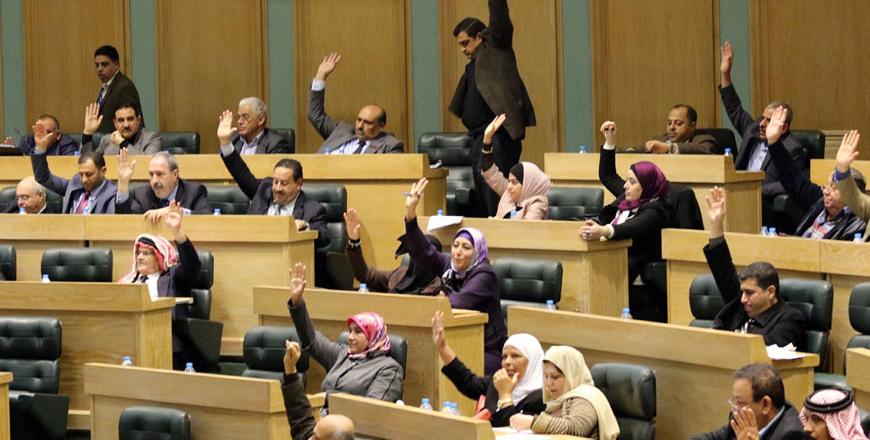You are here
House comes closer to endorsing elections bill
By JT - Feb 22,2016 - Last updated at Feb 22,2016

Lawmakers debate the elections bill on Monday (Photo by Osama Aqarbeh)
AMMAN — The Lower House on Monday approved 46 out of the 68 articles of the draft elections law, including a provision stipulating the open proportional list at the governorate/constituency level.
The new system replaces the notorious one-person-one-vote formula applied since 1993.
The House endorsed dividing the Kingdom into 23 electoral districts, one for each of the 12 governorates, except for Amman which was split into five districts, Irbid into four and Zarqa into two, while each of the three badia districts (northern, central and southern) was considered a governorate for the purposes of the bill at hand, a key component of the country’s political reform process.
The draft law allocates 115 seats for the constituencies and 15 seats for a women’s quota: one seat for each governorate and one seat for each badia district, the Jordan News Agency, Petra, reported.
The draft law stipulates that running for elections for women’s seats has to be within lists without affecting the maximum limit of candidates in the list.
The draft law also stipulates that the ticket includes no less than three candidates and does not exceed the number of seats allocated for the constituency in which the ticket is competing, Petra added.
Prime Minister Abdullah Ensour said that setting the minimum number of candidates on each ticket to three is a positive point and a step forward to enhance collective actions through bloc building ahead of the polls, whose date has not been set yet.
Minister of Political and Parliamentary Affairs Khaled Kalaldeh said that allocating the number of seats in each district depends on changeable criteria such as population, geography and the level of development, stressing the importance of identifying the seat numbers according to a by-law issued for this purpose.
The bill also stipulates that each eligible voter can only pick one list, and has then to name the candidate(s) he/she has chosen from the ticket.
The draft law stipulates that candidates for Circassian, Chechen and Christian seats can only run through lists in the districts where these groups have been designated seats in the House, Petra added.
The proportional electoral system allows winning lists to have seats according to what they achieved of the total percentage of votes cast, and these won seats will be distributed among the ticket members depending on the number of votes each candidate has garnered.
People in public office, including ministers, ministry employees, and mayors, are not allowed to run for the elections unless they resign their posts at least 60 days before the date of voting.
This applies also to the prime minister. Lawmakers on Monday voted down a suggestion to ban the premier from running for parliamentary elections.
Moreover, in regard to by-elections, all officials other than ministers must resign at least 15 days before the deadline to submit applications to run for the polls.
According to the draft law, anyone who intends to run for the elections must be registered in the final voter lists and unlike the draft submitted by the government, which said they must pay JD1,000 each, those running for seats must pay only a non-refundable JD500 to the Treasury.
As for tickets, each should pay JD2,000 to ensure commitment to rules of election campaigning, according to the bill, and the money is refunded in case the applicant’s candidacy is rejected or when the campaign advertisements are not in conformity with the rules.
The date of submitting the applications to run for the elections is determined by the board of commissioners at the Independent Elections Commission (IEC), Petra reported, adding that the date should precede the voting day by at least 25 days.
The bill allows every voter to contest the decision of the IEC board of commissioners to accept any ticket or any individual candidate within a ticket at the Court of Appeal.
The draft considers a ticket as eligible even if the candidates’ number drops below the minimum requirement in case of withdrawal, death or disqualification of members for breaching the law.
Related Articles
AMMAN — The Lower House on Tuesday passed the draft 2015 parliamentary elections law with minor changes following six marathon sessions that
AMMAN — A Royal Decree was issued on Sunday endorsing the 2015 Elections Law, the Jordan News Agency, Petra, reported.The two Houses of Parl
AMMAN — The Lower House on Sunday endorsed the Upper House’s amendments to the 2015 elections law, the last in a reform-oriented legislative












